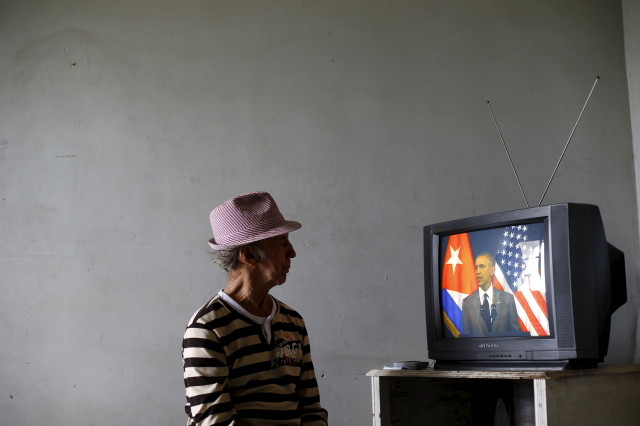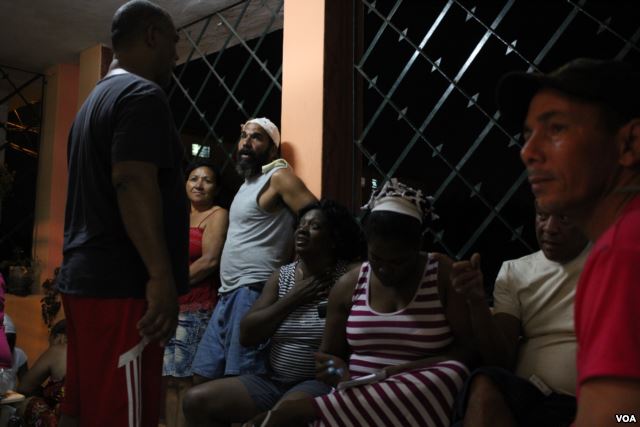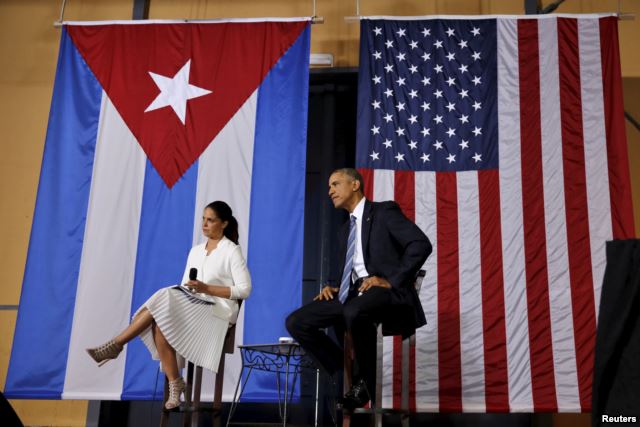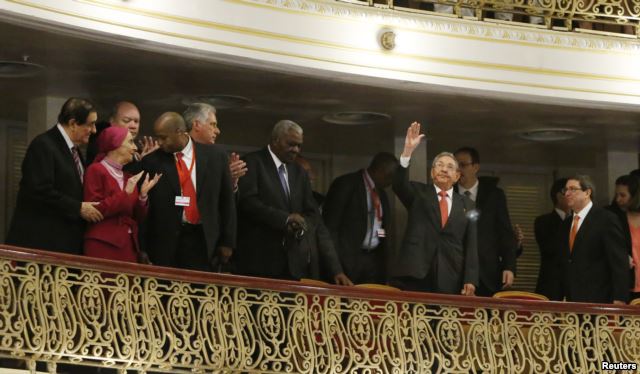As ping-pong diplomacy helped pave the way for a relationship with communist China, baseball may help ease the rapprochement between the United States and Cuba.

A man watches on television as U.S. President Barack Obama delivers a speech at the Gran Teatro de la Habana Alicia Alonso in Havana, March 22, 2016. (Reuters)
The final score won’t matter in an exhibition game between the Tampa Bay Rays and the Cuban National Team.
What will matter is the symbolism of the United States and Cuba sharing their national pastimes with a Cuban defector playing for the American team—and other Cuban-born major league players being cheered as returning heroes in Havana.
President Barack Obama said in Tuesday’s speech he came to Havana “to bury the last remnants of the Cold War.”
56 years of enmity cannot be erased in a two-and-a-half day presidential visit. Or a nine-inning baseball game.
But it is a start.
Obama in Cuba Brings the Pain of Loss to a Miami Exile Family
Dan Le Batard – Miami Herald
I’m not too emotional. I don’t do a lot of down. But I cry just about every time I write about Cuba. My pain is very much borrowed. My grandparents and parents endured it so that my brother and I never would. But it stings just the same.
The fear and desperation of my grandparents combine with the suffering and sacrifices of my parents to produce on odd combination of sorrow and guilt and gratitude that won’t stay down.
The embargo didn’t work. I get it. America does a lot of business with dictators. I get it. And my parents aren’t close-minded, heartless or blinded by unreasonable rage. They’d be all for normalized relations with Cuba if it meant helping, you know, the citizens of Cuba. And maybe this will. Or maybe it won’t. But why would my parents trust a communist government built atop a lifetimes of lies?
MLB Game must Unify all Cubans
Jorge Sedano – ESPN
Major League Baseball, meanwhile, is working with the U.S. and Cuban governments to create a legal way for Cuban baseball players to play in America without having to flee their country. Ideally, this would eliminate the stories of human trafficking involving players such as Livan Hernandez, Orlando “El Duque” Hernandez, Yasiel Puig and many others.
All of this is good news and should be celebrated, though a win for Cuban baseball players and potentially the Cuban people is perceived by many as also a win for Cuba’s totalitarian government.
But sports can be the great unifier. Whether it’s Nelson Mandela as the first post-apartheid president of South Africa using the rugby World Cup to help heal his country, soccer player Didier Drogba pleading with two warring factions in the Ivory Coast to aid the peace process or Jordan Farmar using a basketball camp in Israel to bring Israeli and Palestinian children together, sports can help nations bridge differences and overcome rifts.
Obama’s Visit Will Hasten Freedom in Cuba
Eugene Robinson – The Washington Post
The United States first began to squeeze the Castro government, with the hope of forcing regime change, in 1960. It should be a rule of thumb that if a policy is an utter failure for more than 50 years, it’s time to try something else.
President Obama with American journalist Soledad O’Brien attends a meeting with entrepreneurs as part of his three-day visit to Cuba, in Havana, March 21, 2016.
I say this as someone with no illusions about President Raúl Castro, the spectral but still-powerful Fidel Castro or the authoritarian system they created and wish to perpetuate….
There are those who argue that Obama could have won more concessions from the Castro regime in exchange for improved relations. But this view ignores the fact that our posture of unmitigated hostility toward Cuba did more harm to U.S. interests than good.
Castro Flaps Obama’s Limp Wrist
Editorial Board – Washington Examiner
The arrest of more than 50 anti-regime protestors just before President Obama landed in Cuba underscores the fact that the Castro regime is a tyranny. It does not tolerate dissent.
This reality was also written all over the face of dictator Raul Castro in his press conference with Obama on Monday, when he scolded reporters for asking unscripted questions in public.
It got worse when Castro had the gall to suggest on human rights, on the basis of supposedly deficient public retirement and health system here in the U.S. Obama said he “welcomes” such criticism from the Cuban dictator. We don’t. In saying so, Obama embraced a false moral equivalency.
The Road to Havana
Jeffrey Goldberg – The Atlantic
…[I]n a recent conversation, Ben Rhodes, Obama’s deputy national-security adviser, foreign-policy amanuensis, and secret Cuba envoy, mentioned that it was Obama’s respectful treatment of Raul Castro, Fidel’s brother and the current president, at the December, 2013 funeral of Nelson Mandela, that may have helped the then-nascent, and then-unpromising, negotiations with Cuba turn a corner….

Berta Soler (center), leader of The Ladies in White, a Cuban opposition group, prior to her detention by Cuban authorities on March 20, 2016, hours before President Barack Obama arrived in Havana.
Goldberg: In broader terms, give me the theory of Obama’s case on Cuba. I wrote that he has an unusual willingness to question the assumptions that go into bilateral relations with various countries, and the assumption that he was questioning in the Cuba relationship was, “Why does it have to be this way?” But what’s the larger theory of the case?
Rhodes: I think there are three things. One is, America sometimes makes itself a prisoner of our own history. We have a very complicated history with Cuba. We’ve had significant historical differences with Cuba. But that alone can’t be the rationale for continuing a policy that’s not working. That leads to the second point, which is, he has a deeply pragmatic streak. If you just looked at our Cuba policy in isolation coming into office—it’s not working. The embargo is not working—it’s not doing anything except punishing the Cuban people. The Castro government is still firmly entrenched in power, and the Cuban people are suffering. And the third point is, you take those two facts and you say, “This is holding us back in the hemisphere and in the world, because of our history, because of our unwillingness to look at a failed policy and change course, we essentially have an anchor on American standing in Latin America and, in some cases, in the rest of the world. And why not cut that loose and open up the door to greater opportunities?”
Edward-Issac Dovere – Politico
There’s much more optimism about this trip for others, including some members of the House Republican Conference: In one big move, people say, Obama’s pulling off a pivot to Latin America to match the pivot to Asia that he’s been working on for his entire presidency. With Cuba off the table, goes the thinking, the left in Latin America will be deprived an easy scapegoat in Washington, and with 4 million Americans expected to visit the island annually as soon as the bans are lifted, a lot of money is about to begin flowing.
“I have a lot of my colleagues saying, ‘What do we get?’” said Rep. Tom Emmer (R-Minn.), who’s also traveling with the president and leading the effort with Klobuchar to end the embargo. “What we’re getting is a resetting of our relationships throughout the Western Hemisphere.”
“If we’re going to continue to look backward,” Emmer added, “there’s a Russia or China or, God forbid, Iran; others are willing to step into this void.”
Hard Times for Castro’s Latin American Heirs
Fabio Rafael Fiallo – Real Clear World
These are hard times for Latin America’s populist left, the one that, inspired by the Castro model, was brought to power at the dawn of the present century by Hugo Chavez in Venezuela and Luiz Inacio Lula da Silva in Brazil. After claiming the moral high ground for years, it sees its popularity and electoral weight shrinking by the day….
As long as the region was profiting from the unprecedented boom in world markets for commodities, hard-left governments were able to manage in a capricious and inefficient manner the resources at their disposal….
As soon as the commodities boom came to an end, however, the economic model of the populist left began to crumble and has fared worse than the pro-market agenda implemented in other Latin American countries (Chile, Colombia, and Peru, in particular).



